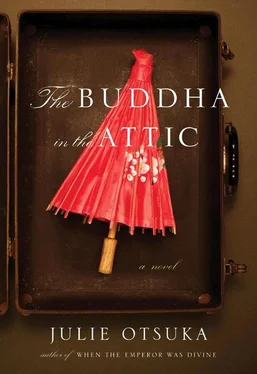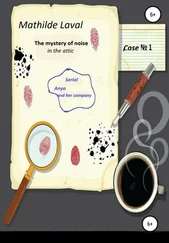THEY DID NOT want us as neighbors in their valleys. They did not want us as friends. We lived in unsightly shacks and could not speak plain English. We cared only about money. Our farming methods were poor. We used too much water. We did not plow deeply enough. Our husbands worked us like slaves. They import those girls from Japan as free labor . We worked in the fields all day long without stopping for supper. We worked in the fields late at night by the light of our kerosene lamps. We never took a single day off. A clock and a bed are two things a Japanese farmer never used in his life . We were taking over their cauliflower industry. We had taken over their spinach industry. We had a monopoly on their strawberry industry and had cornered their market on beans. We were an unbeatable, unstoppable economic machine and if our progress was not checked the entire western United States would soon become the next Asiatic outpost and colony.
MANY NIGHTS, we waited for them. Sometimes they drove by our farm shacks and sprayed our windows with buckshot, or set our chicken coops on fire. Sometimes they dynamited our packing sheds. Sometimes they burned down our fields just as they were beginning to ripen and we lost our entire earnings for that year. And even though we found footsteps in the dirt the following morning, and many scattered matchsticks, when we called the sheriff to come out and take a look he told us there were no clues worth following. And after that our husbands were never the same. Why even bother? At night we slept with our shoes on, and hatchets beside our beds, while our husbands sat by the windows until dawn. Sometimes we were startled awake by a sound but it was nothing—somewhere in the world, perhaps, a peach had just dropped from a tree—and sometimes we slept straight through the night and in the morning when we woke we found our husbands slumped over and snoring in their chairs and we tried to wake them gently, for their rifles were still resting on their laps. Sometimes our husbands bought themselves guard dogs, which they named Dick or Harry or Spot, and they grew more attached to those dogs than they ever did to us, and we wondered if we had made a mistake, coming to such a violent and unwelcoming land. Is there any tribe more savage than the Americans?
ONE OF US blamed them for everything and wished that they were dead. One of us blamed them for everything and wished that she were dead. Others of us learned to live without thinking of them at all. We threw ourselves into our work and became obsessed with the thought of pulling one more weed. We put away our mirrors. We stopped combing our hair. We forgot about makeup. Whenever I powder my nose it just looks like frost on a mountain . We forgot about Buddha. We forgot about God. We developed a coldness inside us that still has not thawed. I fear my soul has died . We stopped writing home to our mothers. We lost weight and grew thin. We stopped bleeding. We stopped dreaming. We stopped wanting. We simply worked, that was all. We gulped down our meals three times a day without saying a word to our husbands so we could hurry back out into the fields. “One minute sooner to pull one more weed.” I could not get this thought out of my mind . We spread our legs for them every evening but were so exhausted we often fell asleep before they were done. We washed their clothes for them once a week in tubs of boiling hot water. We cooked for them. We cleaned for them. We helped them chop wood. But it was not we who were cooking and cleaning and chopping, it was somebody else. And often our husbands did not even notice we’d disappeared.
SOME OF US moved out of the countryside and into their suburbs and got to know them well. We lived in the servants’ quarters of the big houses in Atherton and Berkeley, above Telegraph, up high in the hills. Or we worked for a man like Dr. Giordano, who was a prominent thoracic surgeon on Alameda’s gold coast. And while our husband mowed Dr. Giordano’s lawn and pruned Dr. Giordano’s shrubs and raked Dr. Giordano’s leaves, we stayed inside with Mrs. Giordano, who had wavy brown hair and a kind manner and asked us to please call her Rose, and we polished Rose’s silver and we swept Rose’s floors and we tended to Rose’s three young children, Richard, Jim, and Theo, whom we sang to sleep every night in a language not their own. Nemure, nemure . And it was not at all what we had expected. I have come to care for those boys as though they were my own . But it was Dr. Giordano’s elderly mother, Lucia, whom we came to care for the most. Lucia was even lonelier than we were, and almost as short, and once she overcame her fear of us she never left our side. She followed us from one room to the next as we dusted and mopped and not once did she ever stop talking. Molto bene. Perfetto! Basta cosi . And for many years after her death her memories of the old country would continue to linger with us as though they were our own: the mozzarella, the pomodori , the Lago di Como, the piazza in the center of town where she went shopping with her sisters every day. Italia, Italia, how I long to see it one last time .
IT WAS THEIR WOMEN who taught us the things we most needed to know. How to light a stove. How to make a bed. How to answer a door. How to shake a hand. How to operate a faucet, which many of us had never seen in our lives. How to dial a telephone. How to sound cheerful on a telephone even when you were angry or sad. How to fry an egg. How to peel a potato. How to set a table. How to prepare a five-course dinner in six hours for a party of twelve. How to light a cigarette. How to blow a smoke ring. How to curl your hair so it looked just like Mary Pickford’s. How to wash a lipstick stain out of your husband’s favorite white shirt even when that lipstick stain was not yours. How to raise up your skirt on the street to reveal just the right amount of ankle. You must aim to tantalize, not tease . How to talk to a husband. How to argue with a husband. How to deceive a husband. How to keep a husband from wandering too far from your side. Don’ t ask him where he’s been or what time he’ll be coming home and make sure he is happy in bed .
WE LOVED THEM. We hated them. We wanted to be them. How tall they were, how lovely, how fair. Their long, graceful limbs. Their bright white teeth. Their pale, luminous skin, which disguised all seven blemishes of the face. Their odd but endearing ways, which never ceased to amuse—their love of A.1. sauce and high, pointy-toed shoes, their funny, turned-out walk, their tendency to gather in each other’s parlors in large, noisy groups and stand around talking, all at once, for hours. Why, we wondered, did it never occur to them to sit down? They seemed so at home in the world. So at ease. They had a confidence that we lacked. And much better hair. So many colors . And we regretted that we could not be more like them.
LATE AT NIGHT, in our narrow, windowless rooms in the backs of their large, stately houses, we imitated them. “Now you be the master and I’ll be the missus,” we said to our husbands. “No, you be the master and I’ll be the missus,” they sometimes replied. We tried to imagine how they did it. What they said. Who was on top. Who was on the bottom. Did he cry out? Did she? Did they wake up in the morning with their limbs intertwined? Other times we lay quietly in the darkness and told each other about our days. I beat the rugs. I boiled the sheets. I dug up the devil grass with my farmer’s knife from the south side of the lawn . And when we were finished we pulled up the covers and closed our eyes and dreamed of better times to come. A pretty white house of our own on a long, shady street with a garden that was always in bloom. A bathtub that filled up with hot water in mere minutes. A servant who brought us breakfast every morning on a round silver tray and swept all the rooms by hand. A chambermaid. A laundress. A Chinese butler in a long white coat who appeared the moment we rang a bell and called out, “Charlie, please bring me my tea!”
Читать дальше












